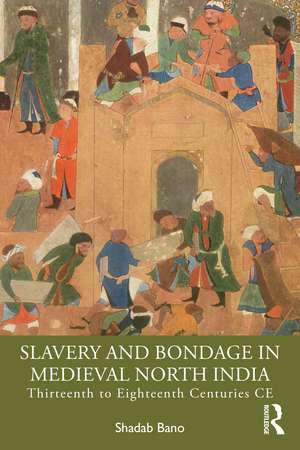Slavery and Bondage in Medieval North India: Thirteenth to Eighteenth Centuries CE
Autor Shadab Banoen Limba Engleză Paperback – 21 noi 2024
The volume will be of great interest to scholars and researchers of South Asian studies, history and slavery.
| Toate formatele și edițiile | Preț | Express |
|---|---|---|
| Paperback (1) | 287.39 lei 3-5 săpt. | +17.48 lei 5-11 zile |
| Taylor & Francis – 21 noi 2024 | 287.39 lei 3-5 săpt. | +17.48 lei 5-11 zile |
| Hardback (1) | 936.08 lei 6-8 săpt. | |
| Taylor & Francis – 21 noi 2024 | 936.08 lei 6-8 săpt. |
Preț: 287.39 lei
Nou
Puncte Express: 431
Preț estimativ în valută:
54.100€ • 57.21$ • 45.40£
54.100€ • 57.21$ • 45.40£
Carte disponibilă
Livrare economică 24 martie-07 aprilie
Livrare express 08-14 martie pentru 27.47 lei
Preluare comenzi: 021 569.72.76
Specificații
ISBN-13: 9781032902784
ISBN-10: 1032902787
Pagini: 192
Ilustrații: 8
Dimensiuni: 156 x 234 x 15 mm
Greutate: 0.32 kg
Ediția:1
Editura: Taylor & Francis
Colecția Routledge India
Locul publicării:Oxford, United Kingdom
ISBN-10: 1032902787
Pagini: 192
Ilustrații: 8
Dimensiuni: 156 x 234 x 15 mm
Greutate: 0.32 kg
Ediția:1
Editura: Taylor & Francis
Colecția Routledge India
Locul publicării:Oxford, United Kingdom
Public țintă
General and PostgraduateCuprins
Introduction Part I: Sultanate and slavery 1. Conquest, enslavement, and slave trade 2. Slaves: the upper strata 3. Slaves at work: ordinary slaves Part II: Contraction and Continuities in Mughal centuries 4. Slave ban, acquisition and trade in Mughal India 5. Slaves in the Imperial establishment: Contradictions 6. Slavery and bondage at large. Conclusion.
Recenzii
“In her Slavery and Bondage in Medieval North India, Shadab Bano explores a very important aspect of our social history, on which little direct research had so far been undertaken. By filling the gap, the author has extensively enlarged our knowledge of a largely ignored segment of the subject population of pre-modern times. Her work is a necessary read, surely, for all students of Indian social history.”
Professor Irfan Habib, Professor Emeritus, Aligarh Muslim University
“Shadab Bano's book on Slavery and Bondage in Medieval North India is a pioneering work that offers a consolidated study of an important practice of owning and controlling human beings. Firmly grounded in archival material, the much needed study cross-fertilises subjection with warfare, labour, sexuality, ideology and economic change.”
Professor Najaf Haider, Centre for Historical Studies, Jawaharlal Nehru University, New Delhi
With careful sobriety, Shadab Bano shows in her book Slavery and Bondage in Medieval North India, how throughout the Sultanate and Mughal periods, the fates of various slave categories differed, and women experienced slavery differently from men. Her treatment of slavery permits the reader to evaluate (and relativize) blanket ‘communalist’ accusations of ‘Muslim oppression’. While sympathizing with the enslaved – especially with the menials among them – the author does not assume that mistreating people deemed inferior was particular to any socio-political system in South Asia or elsewhere.
Professor Suraiya Faroqhi, Ibn Haldun University, Istanbul
Professor Irfan Habib, Professor Emeritus, Aligarh Muslim University
“Shadab Bano's book on Slavery and Bondage in Medieval North India is a pioneering work that offers a consolidated study of an important practice of owning and controlling human beings. Firmly grounded in archival material, the much needed study cross-fertilises subjection with warfare, labour, sexuality, ideology and economic change.”
Professor Najaf Haider, Centre for Historical Studies, Jawaharlal Nehru University, New Delhi
With careful sobriety, Shadab Bano shows in her book Slavery and Bondage in Medieval North India, how throughout the Sultanate and Mughal periods, the fates of various slave categories differed, and women experienced slavery differently from men. Her treatment of slavery permits the reader to evaluate (and relativize) blanket ‘communalist’ accusations of ‘Muslim oppression’. While sympathizing with the enslaved – especially with the menials among them – the author does not assume that mistreating people deemed inferior was particular to any socio-political system in South Asia or elsewhere.
Professor Suraiya Faroqhi, Ibn Haldun University, Istanbul
Notă biografică
Shadab Bano is Professor in the Department of History (Women’s College section) at Aligarh Muslim University. Her primary research thrust is on slave studies and gender history in medieval India, and she has several publications on the social and economic dimensions of slavery and on marginalized women and gender. Her other research interest is in Muslim women’s education and rights in colonial and contemporary India. She has co-edited the volume Teaching/Writing Resistance: Women’s Studies in Contemporary Times with Panchali Ray, which is in press.
Descriere
This book examines slavery in India from the Turkish conquest of North India to the centuries of Mughal rule. It focuses is on the northern Islamic regimes' treatment of slavery but not limited or determined by the actions and demands of the ruling class alone.
